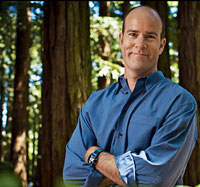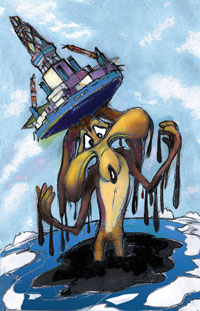sierraclub.org - sierra magazine - may/june 2013 - newborn hope
 Photo by Martin Sundberg
Photo by Martin Sundberg
THEY NEVER LEARN
Shell, the Wile E. Coyote of oil companies
By Michael Brune
Normally, it's my job to argue that drilling for oil in extreme and fragile environments is a bad idea. Lately, though, Shell Oil has been making the case better than I ever could.
It started in February 2012, when Royal Dutch Shell preemptively sued the Sierra Club and our allies to stop us from saying that the company could not safely drill offshore in the Arctic. (That's like Wile E. Coyote suing you for saying that he could not safely fall off a cliff.) If the potential consequences weren't so serious, Shell's subsequent Arctic misadventures would be almost cartoonish.
 Illustration by Lance Jackson
Illustration by Lance Jackson
Last June, then-interior secretary Ken Salazar indicated that Shell would be permitted to drill for oil in the Chukchi Sea off the coast of Alaska. According to the New York Times, Salazar "believed the company's claims that it could collect at least 90 percent of any oil spilled in the event of a well blowout."
Shell soon clarified that it could not actually recover 90 percent of a spill; rather, its cleanup efforts would "encounter" that amount. That's rich. If my eight-year-old daughter, when asked to clean up her room, said she would "encounter" 90 percent of her clothes, books, and toys, I sure wouldn't be impressed. Why would the government be satisfied by similar assurances from Shell?
The stage thus set, Shell proceeded to leap off the cliff. In July, its drill ship the Noble Discoverer nearly ran aground on the Aleutian island of Unalaska after drifting from its moorings. In September, only a day after drilling started on a non-oil-producing preparatory well in the Chukchi Sea, a massive ice pack started drifting toward the site, forcing the rig to beat a quick retreat. Sea ice proved to be a regular disruption.
Days later, a key component of Shell's disaster response operation failed its Coast Guard inspection in spectacular fashion: The new oil containment dome on the ice-breaking barge Arctic Challenger sank in Puget Sound and then "breached like a whale," according to an observer from the Department of the Interior's Bureau of Safety and Environmental Enforcement. The top of the dome, he said, had been "crushed like a beer can." The fiasco forced Shell to cancel full-scale drilling plans for the year.
Like the crazy coyote chasing the Road Runner, Shell never seems to learn.
Somehow, both of Shell's Arctic drill vessels made it back to port in Unalaska by December without further mishaps. But to avoid paying Alaska an estimated $7 million in taxes, Shell wanted to get its two vessels out of state waters before the end of the year. The Noble Discoverer made it as far as Seward before being impounded by the Coast Guard after an inspection found 16 serious issues with the ship's safety management and pollution control systems. Meanwhile, the drill rig Kulluk broke loose from its towline in rough seas and ran aground on the rocky coast of an island in the Gulf of Alaska on New Year's Eve—with 150,000 gallons of diesel fuel and lubricants on board. Fortunately, all 18 crew members were rescued by helicopter, and after a week the rig was recovered as well. Both the Kulluk and the Noble Discoverer are to be towed to Asia for major repairs. This February, Shell abandoned the 2013 drilling season, saying it would "pause" before resuming drilling.
In March, the Interior Department said that Shell couldn't return to the Arctic until it improved its equipment, management, and contingency planning. "Shell screwed up in 2012, and we're not going to let them screw up whenever their pause is removed unless they have these systems in place," Salazar said.
There's no reason to believe, however, that Shell can do any better in the future. The Interior Department should cancel the company's permits, terminate all future lease sales, and put the Arctic off-limits. You can join the Sierra Club's fight to protect this irreplaceable wilderness at sierraclub.org/arctic.
Michael Brune is the executive director of the Sierra Club. You can e-mail him at michael.brune@sierraclub.org and follow him on Twitter and Facebook.